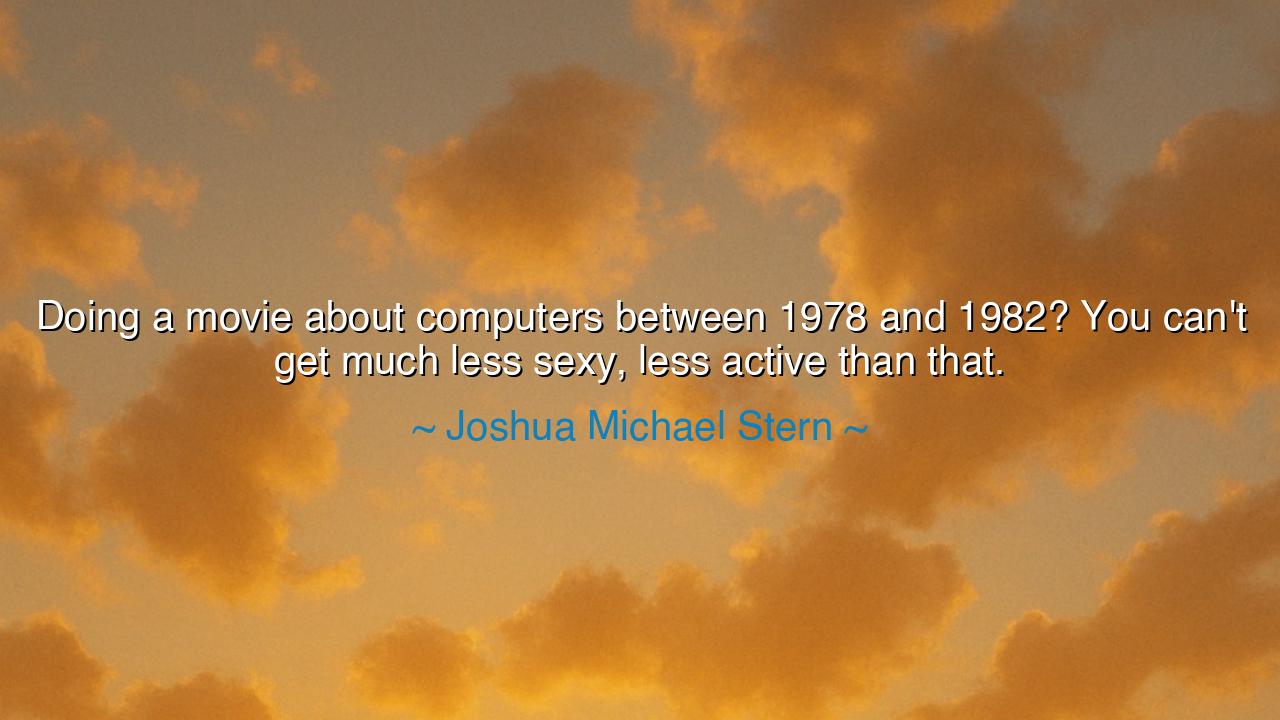
Doing a movie about computers between 1978 and 1982? You can't
Doing a movie about computers between 1978 and 1982? You can't get much less sexy, less active than that.






The filmmaker Joshua Michael Stern, reflecting on his work and the story of innovation, once said: “Doing a movie about computers between 1978 and 1982? You can’t get much less sexy, less active than that.” These words, though spoken with a trace of humor, carry the quiet weight of a profound truth about vision, perseverance, and the nature of human progress. Stern was speaking of an era before glory—before the gleaming age of smartphones, digital empires, and virtual worlds. He was speaking of a time when the computer, that now-sacred artifact of modern life, was little more than a box of circuits and blinking lights—a curiosity for dreamers and eccentrics. His words remind us that greatness is often born in obscurity, that the seeds of transformation are planted long before the world finds them “sexy.”
In those years between 1978 and 1982, the world was changing quietly. The giants of the digital age were still boys in garages—Steve Jobs and Steve Wozniak building the first Apple computer in a cramped workshop; Bill Gates hunched over a keyboard, writing code that would one day command the global mind. There was no glamour in their work, no applause in their long nights. Only faith—faith that what they built in silence would one day speak for them in thunder. And so, when Stern calls the era “less active,” he is acknowledging that these were the years of hidden labor, when the heroes of the digital age fought invisible battles—not with swords, but with ideas.
The ancients would have understood this paradox well. In their myths, fire was not born from spectacle, but from stillness and struggle. Prometheus did not win glory with conquest, but by stealing the light of the gods to share it with humankind. Likewise, the creators of the computer age were Prometheans of silicon—men and women who worked in the shadows, mocked by those who saw no use in their craft, yet driven by a vision that burned brighter than the ridicule surrounding them. What the world called “unsexy,” they knew to be divine.
When Joshua Michael Stern chose to tell their story through film, he was not chasing spectacle; he was chasing truth. He understood that real creation—the kind that alters civilization—does not dazzle at its birth. It grows in obscurity, nourished by patience, by curiosity, and by courage. To dramatize such an age was to tell a story of faith in the unseen, the sacred labor of men and women who dream not for fame, but for the sheer joy of discovery. And though to the eye their work may have seemed still, within those rooms of humming machines and scribbled notes, the world was being reborn.
Consider the tale of Johannes Gutenberg, who spent years perfecting his printing press. His contemporaries saw him as eccentric, his efforts tedious and unremarkable. But when his invention finally bloomed, it reshaped the human story—spreading knowledge faster than ever before, sparking the Renaissance, and awakening minds across continents. So too did the work of those early computer pioneers awaken a new age of thought. From the quiet hum of their machines arose the roar of the internet, the heartbeat of modern civilization itself.
The lesson, then, is this: do not judge the worth of your work by how the world sees it today. What seems dull, what seems small or “unsexy,” may yet be the cornerstone of tomorrow’s transformation. The artist, the scientist, the builder—each must be willing to labor in faith, to endure years of obscurity for the sake of a single spark that may one day ignite the future. For history is not written by those who chase glory, but by those who create despite indifference.
So, children of invention, take heed of Joshua Michael Stern’s words. Do not seek applause before your work is done. Be content to dwell in the unlit rooms of imagination, where ideas grow quietly into miracles. Remember that every towering creation was once invisible, every revolution once whispered. The world may not yet see the beauty of what you build—but build it anyway. For in the stillness of your labor, you are already part of the eternal story of creation—the same story that began long ago, in the unremarkable hours between 1978 and 1982, when the hum of computers became the heartbeat of the future.






AAdministratorAdministrator
Welcome, honored guests. Please leave a comment, we will respond soon